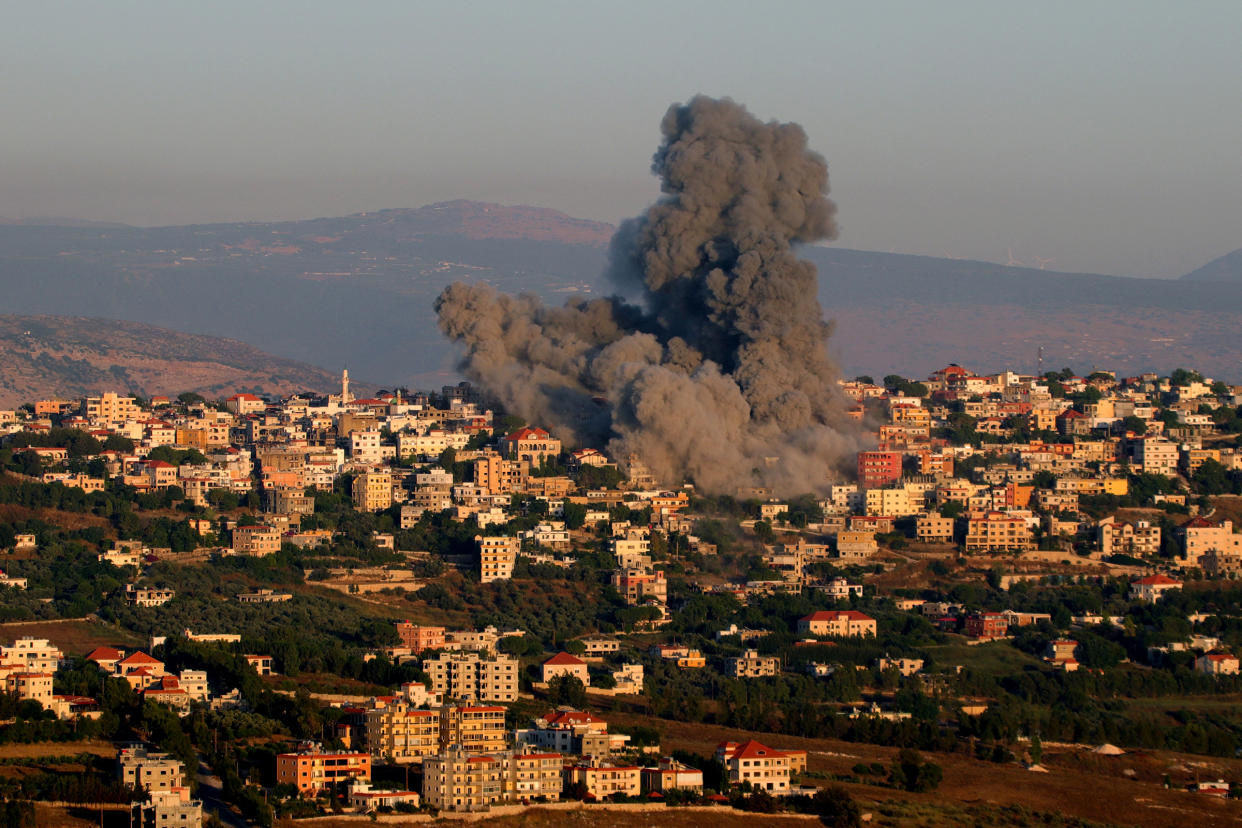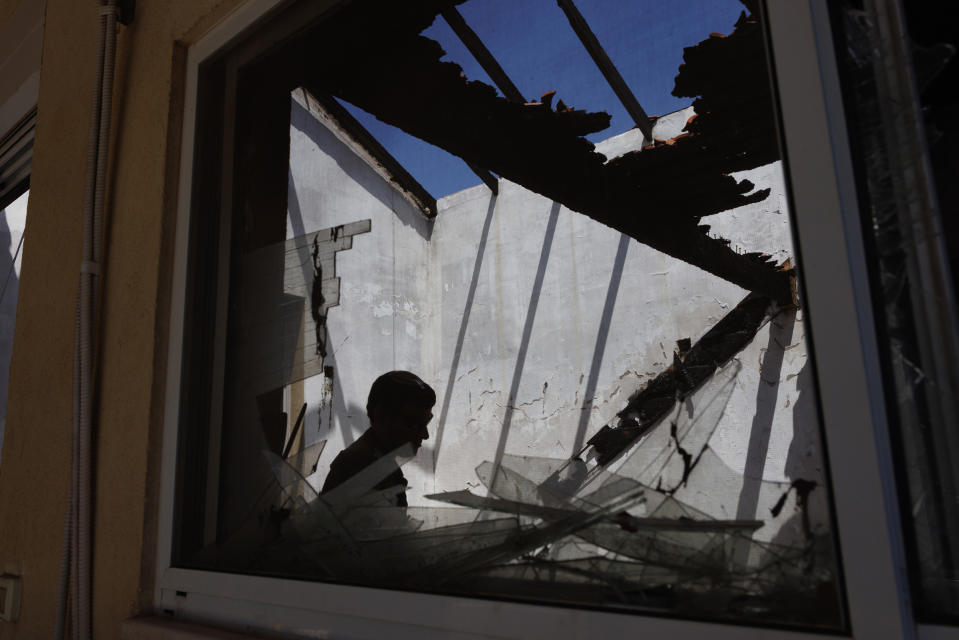The Coming Israel-Hezbollah War

Black smoke billows following an Israeli airstrike in the southern Lebanese village of Khiam near the Israeli border on June 21, 2024, amid ongoing cross-border clashes between Israeli troops and Hezbollah fighters. Credit - Rabih Daher—AFP/Getty Images
If the deadly and destructive Israel-Hamas war wasn’t already enough, there is a growing fear of a much broader confrontation between Israel and Lebanon’s Hezbollah. Earlier this week, hours after the Lebanese militant group released a nine-minute video showing surveillance drones patrolling northern Israel, Israeli officials said the country is ready for an “all-out war” and approved plans for an offensive.
These developments come after near-daily border fire since the Oct. 7 Hamas attack that has displaced tens of thousands of people on both sides of the Israel-Lebanon border, and killed at least 400, the majority of which are Hezbollah fighters.
After exhibiting the drone footage, Hezbollah chief Hassan Nasrallah threatened a battle “with no limitations, no rules, and no ceilings” if Israel expands the scope of the current conflict. Nasrallah even threatened to attack E.U. member state Cyprus if any of its military facilities were opened to Israel in the looming confrontation.
Israel, by finalizing its plans for an all-out-war, is signaling its determination to alter the current balance of power in the north, stem the rocket fire from Hezbollah, and to possibly set up a de facto buffer zone several miles deep into Lebanese territory. Even if that means a major show of force.
In the days and weeks ahead, the Biden Administration will have a crucial role to play in averting war or limiting its worst outcomes, particularly in light of Iran’s threat to join the battle in Hezbollah’s defense. U.S. mediation can also provide diplomatic off-ramps once Israel and Hezbollah are prepared to explore a political settlement that could bring their fight to a close.
Nasrallah made his latest threats after a visit to Beirut by Amos Hochstein, a senior aide to Biden. Hochstein is an experienced negotiator who successfully facilitated the demarcation of the maritime borders between Israel and Lebanon in 2022, but he is not a miracle worker. In his latest round of shuttle diplomacy between Jerusalem and Beirut, he probed for ways to restore calm to the Israeli-Lebanese frontier absent a ceasefire in Gaza. But Hezbollah flatly rejected the premise of his initiative. The group insists that the war in Gaza—which has outraged Arab public opinion over the high death toll—must first come to an end. The group also turned down U.S. suggestions that it use its influence with Hamas, another Iran-backed group, to encourage its acceptance of the proposed ceasefire.
Intermediaries in Beirut have not completely given up. They are still quietly working with Biden’s envoy to explore whether a concession short of a full cessation of Hezbollah’s rocket fire may be enough to unlock a political settlement. Such a scenario could entail a redeployment of Hezbollah’s elite forces and anti-tank units, which constitute a primary concern for Israelis, away from the border. But it is not at all clear whether such a proposition will prove acceptable and enough to either party.
In fact, Hochstein was met in Jerusalem by a shared assessment that the situation on its northern border is no longer tenable. Hezbollah would do well to understand that no Israeli government, let alone the most right-wing in the country’s history, can accept what Nasrallah boasted about in his speech as a de facto buffer zone that his group created within Israeli territory. For all Israelis, not just Netanyahu, the status quo is simply unacceptable.
Likewise, inflated threats by senior Israeli officials warning that “Beirut will not be immune” from destruction, are unhelpful. An Israeli military offensive into Lebanon need not necessarily include the leveling of entire residential blocs in Hezbollah’s stronghold of southern Beirut, as was the case in the last major war the two belligerents fought in 2006. Such actions would force the conflict further up the escalation ladder, compelling a now much more capable Hezbollah to rain its ballistic missiles on Israeli cities, including Tel Aviv. U.S. officials are voicing serious concerns that Israel’s sophisticated air defense systems will be overwhelmed by Hezbollah’s fire power, believed to include over 100,000 rockets and swarms of suicide drones.
When Israeli and American defense chiefs meet in Washington next week, they need to clearly define the contours of the looming confrontation. It must remain within the now largely depopulated border areas of Israel and Lebanon. And firm messages of deterrence should be communicated to Iran to preclude its direct involvement, coupled with private assurances that the U.S. will continue to actively work toward de-escalation.
Ultimately, even Israeli Chief of Staff Herzi Halevi recognizes achieving a new status quo in the north will require an indirect understanding with Hezbollah. The outlines of such an arrangement have been put forward by American and French mediators. They include a withdrawal of critical Hezbollah’s capabilities up to six miles from the border, an enhanced presence by the Lebanese Armed Forces (LAF) and the United Nations Interim Force in Lebanon (UNIFIL), a peacekeeping force that straddles the border, coupled with guarantees and strategic monitoring by the U.S. and France. Progress toward resolving some of the contested points along the border would further facilitate such an agreement.

Regrettably, however, Washington’s inability to force a ceasefire in Gaza, coupled with Iran and Hezbollah’s determination to continue extracting a price from Israel via Lebanon, have precluded a diplomatic resolution.
“War is the continuation of politics by other means,” Prussian military strategist Carl Von Clausewitz famously asserted. It seems that, for Israel and Lebanon, the time for politics is ending and the time for war is almost upon us.
Contact us at letters@time.com.


